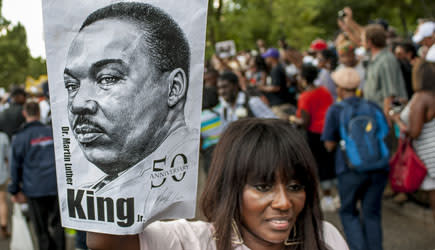March On Washington 50 Years Later: Do We Have Jobs And Justice? [Infographic]

Fifty years ago today, Dr. Martin Luther King Jr. cemented his place in American history with his "I Have A Dream" speech. But what's less commonly known is that the address was actually an ad-libbed coda to an event billed as the "March on Washington for Jobs and Freedom," a rally not just for political and racial harmony but also economic equality.
Today, an African-American shows up to work every day in the Oval Office of a White House that was built by slave labor. But how far have African-Americans come when it comes to achieving economic equality?
When the March took place on August 28, 1963, African-Americans were still being held back by segregation. The Bureau of Labor Statistics only began tracking employment data for African Americans in 1972, but studies have provided data demonstrating the economic exclusion of African-Americans throughout the early 20th Century. As the National Bureau of Economic Research has noted, just 5.5 percent of African-American men in the South were working as white-collar professionals by 1950, as compared to 29.5 percent of White men. And the vast majority of those African-American professionals were working in segregated environments as educators and preachers.
What about today? African-Americans have made major strides in education. But they are twice as likely to be unemployed as whites, just as they were in 1972, when the government began officially tracking employment data for African-Americans. And as AOL Jobs has reported, studies have shown that the financial crisis has been far harsher to African-American workers than their White counterparts. See the infographic below for more info.

